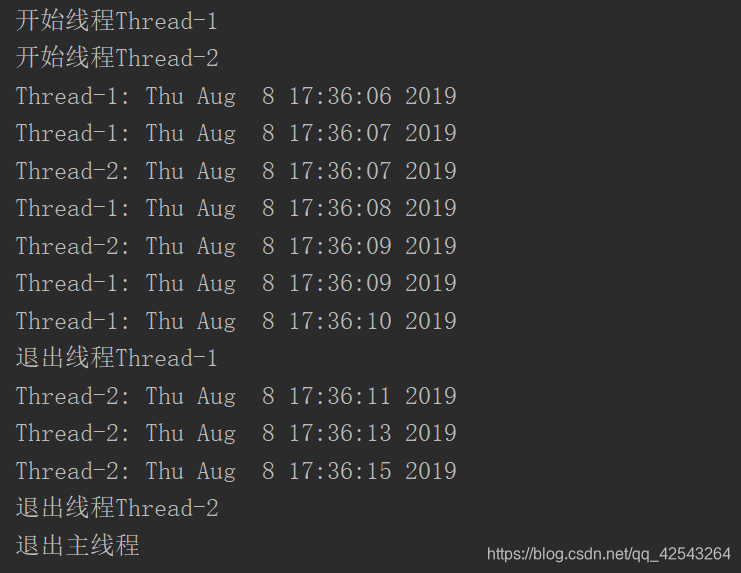Python中使用线程有两种方式:函数或者用类来包装线程对象。
函数式:调用 _thread 模块中的start_new_thread()函数来产生新线程。语法如下:
_thread.start_new_thread ( function, args[, kwargs] )
参数说明:
- function - 线程函数。
- args - 传递给线程函数的参数,他必须是个tuple类型。
- kwargs - 可选参数。
import _thread
import time
# 为线程定义一个函数
def print_time(threadName, delay):
count = 0
while count < 5:
time.sleep(delay)
count += 1
print("%s:%s"%(threadName, time.ctime(time.time())))
# 创建两个线程
try:
_thread.start_new_thread(print_time, ('Thread_1', 2) )
_thread.start_new_thread(print_time, ("Thread_2", 4) )
except:
print("Error: 无法启动线程")
while 1:
pass
运行结果:

线程模块
Python3 通过两个标准库 _thread 和 threading 提供对线程的支持。
_thread 提供了低级别的、原始的线程以及一个简单的锁,它相比于 threading 模块的功能还是比较有限的。
threading 模块除了包含 _thread 模块中的所有方法外,还提供的其他方法:
- threading.currentThread(): 返回当前的线程变量。
- threading.enumerate(): 返回一个包含正在运行的线程的list。正在运行指线程启动后、结束前,不包括启动前和终止后的线程。
- threading.activeCount(): 返回正在运行的线程数量,与len(threading.enumerate())有相同的结果。
除了使用方法外,线程模块同样提供了Thread类来处理线程,Thread类提供了以下方法:
- run(): 用以表示线程活动的方法。
- start():启动线程活动。
- join([time]): 等待至线程中止。这阻塞调用线程直至线程的join() 方法被调用中止-正常退出或者抛出未处理的异常-或者是可选的超时发生。
- isAlive(): 返回线程是否活动的。
- getName(): 返回线程名。
- setName(): 设置线程名。
使用 threading 模块创建线程
我们可以通过直接从 threading.Thread 继承创建一个新的子类,并实例化后调用 start() 方法启动新线程,即它调用了线程的 run() 方法:
import threading
import time
exitFlag = 0
class myThread(threading.Thread):
def __init__(self, threadID, name, counter):
threading.Thread.__init__(self)
self.threadID = threadID
self.name = name
self.counter = counter
def run(self):
print("开始线程" + self.name)
print_time(self.name, self.counter, 5)
print("退出线程" + self.name)
def print_time(threadName, delay, counter):
while counter:
if exitFlag:
threadName.exit()
time.sleep(delay)
print("%s: %s" % (threadName, time.ctime(time.time())))
counter -= 1
# 创建新线程
thread1 = myThread(1, "Thread-1", 1)
thread2 = myThread(2, "Thread-2", 2)
# 开启新线程
thread1.start()
thread2.start()
thread1.join()
thread2.join()
print("退出主线程")运行结果:
